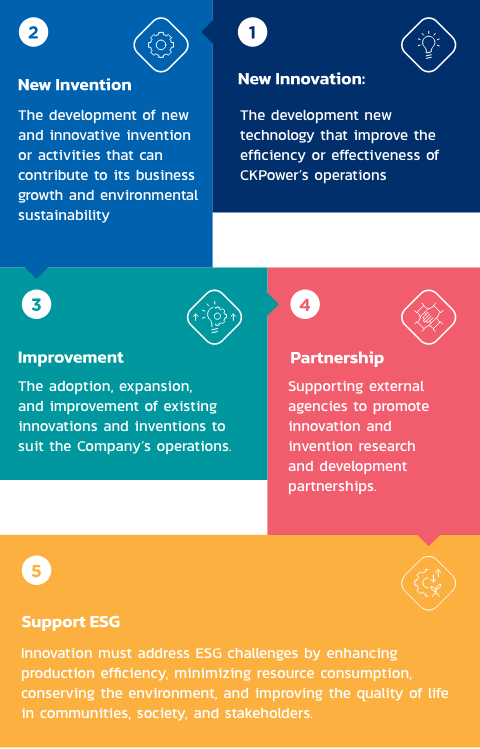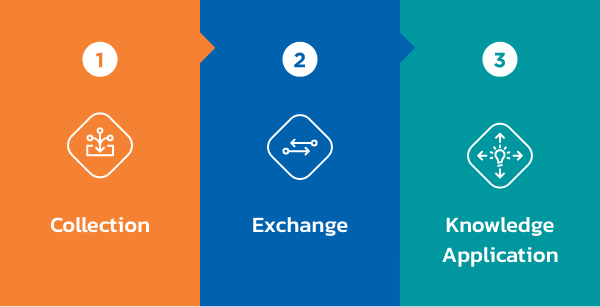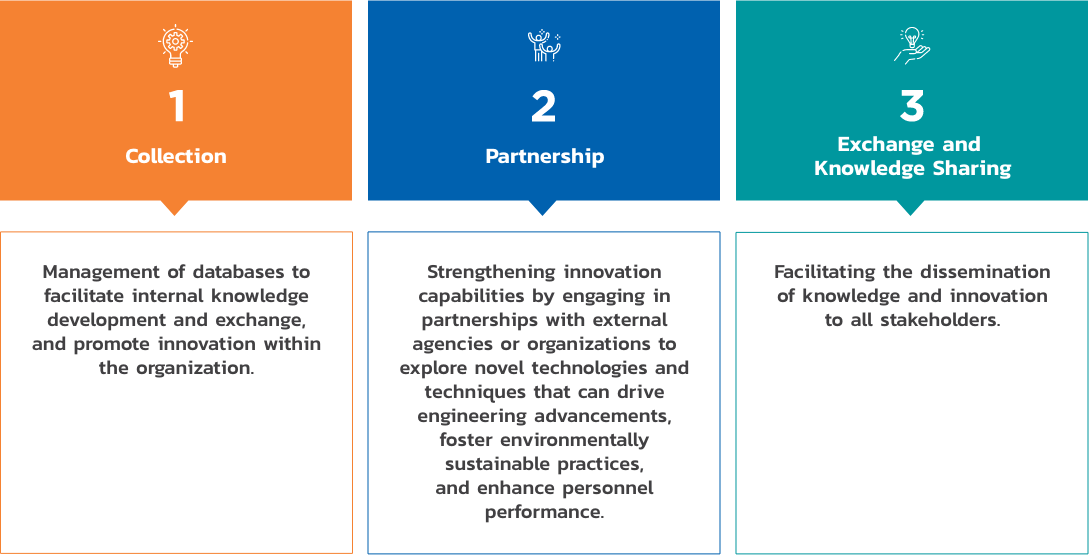Innovation
CHALLENGES
Ultimately, CKPower recognizes the significance of innovation in delivering high-quality products to customers while also minimizing environmental impact across the supply chain.
Thus, innovation management presents both a challenge and an opportunity for CKPower to improve its competitiveness in the power plant industry and meet the needs and expectations of consumers while also taking into consideration the well-being of society, environment conservation, and the sustainable development of the organization.
OPERATIONAL GUIDELINES
CKPower has established policies that prioritize the integration of innovation management into efficient resource management, such as development of engineering knowledge, personnel performance, utilization of advanced technology, and an environmentally friendly management system to mitigate the environmental and social effects of the power plant’s operations, as well as developing a cost management system that can increase the competitiveness of the organization and maximize returns for stakeholders. In addition, the Company actively and continuously promotes learning, development, and innovation through three-pronged guidelines on knowledge development for innovation.
Innovation Management Framework
CKPower has established a comprehensive innovation development utilizing their knowledge and creativity to drive organizational, environmental, and social development.

Innovation Knowledge Development Guidelines
CKPower prioritizes the selection of advanced technology and high-efficiency green production methods. To this end, innovation knowledge development guidelines have been developed, comprising the following components:

- Collection: Handbooks and databases are curated by employees with expertise in each function to serve as educational materials for employees at all levels. This ensures that knowledge is shared within the organization and innovation can be advanced through collaboration and information exchange.
- Exchange: CKPower promotes the exchange of knowledge and experiences among employees by providing training programs for engineers and publicizing its data sources. This facilitates the transfer of practical knowledge and experiences, which helps in the development of new innovations.
- Knowledge application: CKPower develops and compiles new work standards to enable employees to consistently expand their knowledge and apply it in developing innovative solutions.
The company encourages employees to use their creativity and expertise to develop new ideas and apply them to enhance production efficiency, reduce resource consumption, and improve environmental sustainability while addressing societal needs and challenges. To facilitate operations during a digital transformation, CKPower has adopted modern technologies to improve its work systems and enhance efficiency in accordance with the Industry Framework, a standardized model for business processes in the industry.
2022 Achievements

In 2021, CKPower developed 2 new innovation projects and continuous research and development of eco-friendly production optimization innovations, the company has successfully implemented 13 innovations, resulting in the reduction of cumulative energy consumption by 5,980 MWh, which is equivalent to 2,763 tCO2e that would have otherwise been emitted, and it currently has 16 innovators who contribute to its innovation pipeline.
INNOVATION AND DIFFUSION OF INNOVATION
With the determination to develop a model for eco-friendly hydroelectric power plants on the Mekong River, the Xayaburi Hydroelectric Power Plant features not only up-to-date technology but also innovative design and construction never before seen in the region, such as a multi-system fish passage. Furthermore, CKPower strives to support the dissemination of knowledge and experiences of success in various aspects to all sectors through activities like power plant facilities tours and seminars and lectures on the aforementioned innovations, along with consistently sharing knowledge on clean energy, renewable energy, and energy-saving innovations as well as energy efficiency guidelines. The Company is also committed to promoting and passing on knowledge of innovation among youths living in communities surrounding the plant, which in turn supports the achievement of the United Nations Sustainable Development Goal 4 (Quality Education) in a tangible way. In 2021, a total of 1,530 individuals participated in these activities, which aimed to promote the adoption of sustainable practices and support the development of the local community.
CKPower has undertaken a digital transformation in order to improve the readiness of its business operations by implementing “SAP S/4 HANA 1610 SP 2” to reduce the complexity of the work process for operators while increasing efficiency. Additionally, the Company has updated its internal work process to prepare for the organization’s future growth in accordance with the “Industry Framework,” an industry standard model for business processes, in order for the company to achieve its goal of implementing a digital transformation within the allotted timeframe and budget with full efficacy.
Efficiency and prevent losses in production ecofriendly innovations
The engineering team improved the cleaning of the air compressor of the gas turbines at Bangpa-in Cogeneration Power Plant by determining the appropriate cleaning interval and reduced the washing frequency through an online system, which saved water without affecting the efficiency of the air compressing system. The system improvement addressed an issue with the usual online water wash, for which the production had to be lowered to the condition suitable for cleaning, thus preventing the gas turbines from operating optimally and resulting in loss of both production units and natural gases used. CKPower successfully reduced the amount of natural gases used by 14,122 MMBTU per year, reduced energy consumption by 293 MWh, equivalent to 135 tCO2e , and lower water usage by 40 cubic meters per year, equivalent to savings of 1,088,962 Baht in energy and water expenses.
Bangpa-in Cogeneration Power Plant discovered that the excessive pressure of the gas compressor activated the excess flow valve system, resulting energy loss. To this end, they studied and improved the excess flow valve system and reduced the pressure of the gas leaving the pistons to ensure that the valve system would not be triggered. As a result of this improvement, CKPower successfully saved 238 MWh of energy for gas compression, equivalent to savings of 885,952 Baht in energy expenses, and 110 tCO2e .
Bangpa-in Cogeneration Power Plant has enhanced the efficiency of the production system by launching a project aimed at reducing heat loss during production through the inspection, analysis, and optimization of the flow pressure at each point in the pipe system to reduce the energy consumption of the gas compressor, which pressurizes the system. This project has reduced energy consumption by as much as 1,904 MWh, equivalent to 880 tCO2e per year, equivalent to savings of 7,090,726 Baht in expenses. The project won the Power Utility of the Year Award – Thailand at the Asian Power Awards 2022, hosted by Asia’s leading magazine in the electric power industry.
Bangpa-in Cogeneration Power Plant has instituted a policy to promote the reduction of energy use in order to help reduce the cost of electricity production, extend the life of machinery, and decrease ensuing maintenance costs. To this end, the power plant has implemented an initiative for the joint use of air dryers between BIC-1 and BIC-2 as well as reduced the number of air dryers in use at BIC-2 by one unit in order to reduce energy consumption by 2,875 kWh during the production process, equivalent to 1.3 tCO2e per year.
As there is less heat that needs to be dissipated during off peak periods, coupled with lower temperatures at night, there is no need for cooling towers to operate at maximum capacity. Thus, the company has begun to deactivate one cooling fan during 00.00-06:00 hrs. every day, which reduced electricity consumption by 188,490 kWh annually or an equivalent to 87 tCO2e per year, equivalent to savings of 701,840 Baht in expenses. In addition, it helped reduce the number of working hours and prevented delays in machinery fatigue.
Bangpa-in Cogeneration Power Plant has managed the activation and deactivation of the cooling fan in the cooling tower to reduced power consumption and the activation of a cooling pump to better divert heat to the cooling tower so as to reduced electricity use within the plant and loss of steam due to evaporation by the cooling fan. In 2022, The initiative cut down power consumption by 103 MWh, equivalent to 47 tCO2e per year. The project won the Innovative Power Technology of the Year at the Asian Power Awards 2021, hosted by Asia’s leading magazine in the electric power industry.
Nam Ngum 2 Hydroelectric Power Plant conducted a study on the relatively rapid decrease in the insulation resistance of power generators, as the equipment can be damaged when such resistance drops too low and investigated the issue of dust collecting in the carbon brush during production. After data collection and the installation of a slip ring dust collector, it was found that the device helped in the following ways:
- Slow down the decrease of insulation resistance.
- Preventing the operational temperature of the slip ring from getting too high and reducing the temperature by 40-47 degrees Celsius.
- Reduce PM 2.5 from the carbon brush in the area of operation.
- Extend the lifespan of the carbon brush to an extent
Nam Ngum 2 Hydroelectric Power Plant conducted a study on the relatively rapid decrease in the insulation resistance of power generators, as the equipment can be damaged when such resistance drops too low and investigated the issue of dust collecting in the carbon brush during production. After data collection and the installation of a slip ring dust collector, it was found that the device helped in the following ways:
Bangpa-in Cogeneration Power Plant 1 (BIC-1) has implemented the Adjustment and Control of the Chloride Range in the Cooling Water of BIC1 program to increase chloride concentration, as the amount of effluent released from the cooling tower depends on the coolant cycle of concentration, which is correlated with chloride concentration. Given this, the Company has undertaken to increase chloride concentration in order to reduce the amount of effluent produced by the cooling tower at Bangpa-in Cogeneration Power Plant 1. In 2022, BIC-1 was able to reduce its effluent by 54,347 cubic meters as well as save over Baht 1.4 million in operation costs. This program is safe and reduced water usage, monitored and controlled by specialized personnel, thus demonstrating CKPower’s commitment to enhancing the efficiency of energy production alongside environmental conservation.
Due to reduced consumer demands for steam energy at Bangpa-in Power Plant 1, resulting in residual steam which is then discarded into the compressor and thus a large amount of energy wasted during the production process, the Company recognized the opportunity to channel this excess steam into the electricity production process and, consequently, initiated an engineering research project to reduce wastage by diverting excess steam into electricity production during periods of low steam energy usage. To this end, the Company has undertaken a project to increase the energy production capacity of the steam turbine to achieve a higher 25.3 MW as well as the efficiency of the production process by enabling the steam turbine control system to utilize residual steam to successfully generate 1.3 MW of electricity.
In 2022, the company's continuous development of innovations and ongoing projects has resulted in significant achievements. The company has been able to reduce gas compression energy consumption 3,250 MWh, cost savings of 12,100,253 Baht in energy expenses also reduce greenhouse gas emissions 1,500 tCO2e per year. These accomplishments have led to the company receiving the prestigious "Gas Engine Combined Cycle Power Project of the Year - Silver" award at the Asian Power Awards, organized by Asian Power magazine, a leading publication in the Asian electricity industry.
Bangpa-in Cogeneration Power Plant has undertaken the improvement of its machinery lubrication injection system to increase efficiency and match the actual consumption level, thus significantly reducing the amount of lubricant used and hazardous waste generated. In 2022, the power plant effectively reduced the amount of lubricant used and hazardous waste generated by approximately 8,151 liters per year, thus saving around 125,460 Baht per year in cost of lubrication and waste oil disposal, cost savings of approximately 885,952 Baht in energy expenses also reduce greenhouse gas emissions 110 tCO2e per year.
Innovation for biodiversity conservation
Food security and biodiversity are vital to the way of life in communities along the Mekong River. As such, the Xayaburi Hydroelectric Power Plant has been conducting several studies to better understand the life cycles, migration pattern, and physiological features of the various fish species in the river. The Project has successfully implemented a PIT-tag system to trace tagged fish in the fish passage facilities.
From a very early phase, even before project construction began, the Xayaburi Hydroelectric Power Plant studied and tracked the migration patterns of fish in the river. To enhance the fish monitoring system and to gain a better understanding of the behavior of various species, XPCL entered into a collaboration with Charles Sturt University in New South Wales, Australia, Karltek Pty Ltd, Australia, as well as the National University of Laos (NUOL) and the Living Aquatic Resources Research Center (LARREC) of Lao PDR to research, design, and develop the PIT-tag system.
The multi-system fish passage facilities at the Xayaburi Hydroelectric Power Plant comprises of a vertical-slot fishway and large fish locks with the size of 18 meters in width and 16 meters deep at the deepest part. The design of the facilities has been tailored specifically to the sizes and behavior of the fish in the Mekong River. There are relatively few studies on fish migration in the Mekong compared to research in other regions, such as in America or Europe. In addition, physiological features and fish species vary greatly in different parts of the Mekong. Therefore, the fish migration monitoring system designed for the Xayaburi Hydroelectric Power Plant is considered an innovation and is the first deployed in the Mekong Mainstream.
These large sizes had never before been covered by PIT-tag antenna, so one of the first questions which needed an answer was to check if existing antenna would function under these conditions. To design an effective PIT-tag system, the working group created a prototype to study its efficiency to detect PIT-tags. After completing the preliminary stages, the system was installed at the Xayaburi Hydroelectric Power Plant. The major components of the system are the antenna which detect the tagged fish when passing through the slots. The largest antenna put in place is 8x1.5 meters, enabling highly accurate detection of tagged fish.

